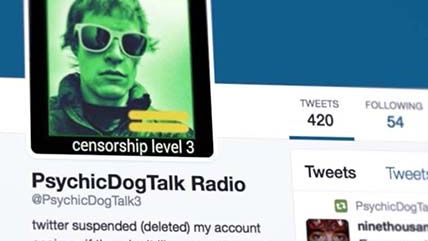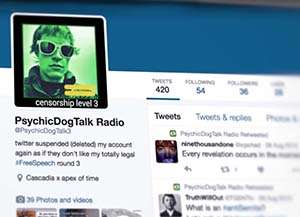Should Anti-Semitic Calls for Violence Be Illegal?
The fine line between ugly words and true threats


Activists and prosecutors in the picturesque mountain town of Whitefish, Montana, believe police prevented a bloodbath when they arrested 29-year-old David Lenio.
"Best way to counter the harm #jewish #policies is causing [sic] is #ChapelHillShooting styling [sic] killing of #jews till they get the hint & leave," one of his tweets read. In another, Lenio said he was "not even opposed to shooting up a random school like that sandy hoax stunt only realer."
As University of California, Los Angeles law professor and Washington Post blogger Eugene Volokh points out, "Speech can't be suppressed because of the ideas it expresses, no matter how offensive and wrong we might view those ideas to be." But that didn't stop authorities in Montana from locking Lenio up for five months over charges that would later be dismissed.
Lenio's journey from the keyboard to the jail cell began on February 15, 2015, when the publicist and political activist Jonathan Hutson took to Twitter in the wake of two mass shootings in Copenhagen. Both were perpetrated by an Islamic extremist perturbed by cartoon depictions of the Muslim prophet Muhammad. Hutson noticed a series of ugly tweets being directed at him from a user called "Psychic Dog Talk Radio." This was Lenio's account, which is no longer publicly available on Twitter.
Hutson, who did not respond to interview requests for this story, dug deeper and found that Lenio had tweeted other anti-Semitic conspiracy theories and violent fantasies in the days leading up to their virtual encounter. He reported the behavior to authorities, who charged Lenio with felony counts of defamation and intimidation.
Montana's defamation statute at the time was so broad that it outlawed any speech that subjects individuals, groups, classes, or associations "to hatred, contempt, ridicule, degradation, or disgrace." The county argued that by making statements such as "the Holocaust has been proven a lie," Lenio was defaming all Jewish people.
The judge disagreed, siding with Lenio's defense that the law was "overly broad," dismissing the defamation charge, and deeming the statute unconstitutional.
"In America, prosecutions for speech that expresses racial or religious hostility almost never happen, in large part because prosecutors recognize that that kind of speech is fully protected" by the First Amendment, Volokh says. "This is a rare exception where for whatever reason the prosecutor decided to push the envelope."
Lenio was released from jail and is currently living with his parents in Michigan. He isn't off the hook, though: He's set to face trial on the second charge of intimidation, or making threats, in early March.
Francine Roston, one of two rabbis living in Montana's Flathead Valley, believes she was one of Lenio's potential targets. She says Lenio's tweets, coupled with the fact that he retrieved guns from a nearby storage facility in the preceding days, should be seen as "true threats" against the town's small Jewish population and school children.
"We do a lot of hand-wringing and praying and calling for action after school shootings. Here's a case where, potentially, a school shooting was averted," Roston says. "If this speech is not defined as threatening, then I think we're in danger."
Volokh admits the question of whether the tweets amount to true threats is a "much closer question." But Brent Getty, Lenio's public defender, believes his client's posts were simply the juvenile rantings of a frustrated young man. He points out that they were not directed at any particular target and may never have been discovered by the residents of Whitefish if not for Hutson's intervention.
"It'd be the equivalent of, back in colonial days, someone yelling on the street corner," Getty says. "And that's the biggest problem with the state's case, that these are not directed to a specific person."
This article originally appeared in print under the headline "Should Anti-Semitic Calls for Violence Be Illegal?."


Show Comments (18)